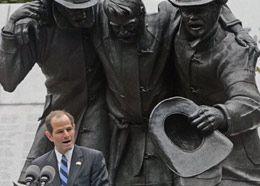 AP Photo/Mike Groll Eliot Spitzer speaks during a ceremony at the New York State Fallen Firefighters Memorial last year. |
For those who haven’t yet read my intriguing biography at the end of these articles, I’m from New York. Now most of the time being from the Empire State is great; largest fire department in the world then a short drive and you are in some of the smallest. Guys who can fight fires on the 75th story of high rises and firefighters who can get 500 gallon-a minute drafts out of a thimble. This month, however, has not been a stellar time to be a New Yorker.
The behavior of our former governor Eliot Spitzer is certainly fodder for late night shows and the Internet after being linked to a prostitution ring. His actions created a myriad of reactions here. One of my roles for my employer is to handle government affairs — no pun intended — for fire service issues. I can honestly say from a fire service perspective I’m not sorry to see the man go. And I do think that official and unofficial leaders in the fire service can learn a lot from his actions (feel free to insert your own joke here).
As each of us continues to grow in this industry, we have individuals whom we look up to. I can think of a few instances where an individual whom I thought almost infallible, failed in their actions. I can think of some instances where the failures were so horrific that I was no longer able to look at them in the same way, to consider their actions worthy of duplicating; I could no longer trust them.
It takes years to build trust in others. For those of you just starting out, it’s a long road, a road paved with not just what you say but how you act both on and off the fireground. Losing that trust doesn’t take long and can often happen in just one action or even a single moment of inaction. Depending on the level of trust lost, it can take a very long time to regain that ground. Sometimes, like our governor found out this week, it can be seemingly lost forever.
Unique individuals
Every fire department, career and volunteer, is made up of unique individuals, yet at the same time there is much that is similar. I often joke that the people are the same but the names have been changed to protect the guilty! Even with this homogeneity within our organizations, we all know that firefighter or officer who we just feel better with. We know that when the chips are down they’ll watch our back as well as their own. We know that they have knowledge of building construction, fire behavior, strategy and tactics. We’re also aware of the fact that they have an understanding our department, its equipment and ultimately each of us and our ability, how far to take us and what we can accomplish. Ultimately we know is that we trust them.
This trust is something each of us can strive, work hard and study for, but at the end of the day it is not something you can take; it is something that is given to you by those around you. Each of us needs to strive to ensure that we not only work on being given this level of trust, but also continually put in the effort to maintain it. Our actions, particularly on the fire and training grounds, can quickly allow people to take back the trust placed in us. It is ultimately much easier not to lose it in the first place than to have to work to regain it.
What we can all learn is that when it comes to our safety, people are watching. Some people are watching, salivating at the thought of our failure, just waiting to pull us down. Some are watching with near adoration, like a child to a parent. Some are watching as friends, willing to help, talk and keep us from falling. Some are the people we look up to and hope not to disappoint, like a parent to a child. Of these, the first two are likely the most fraught with perils. You must identify these individuals and interact with them, and remember that their reactions will be strongest of all. The last two keep close by. Don’t be offended by their critiques; in fact, invite that review and let them know you want their input.
Finally, just do what is right — and don’t confuse it with what is the most convenient as they are seldom the same thing. Although this seems simple; follow your SOPs and appropriate safety rules even, perhaps especially, when those around you aren’t. They notice, they’ll talk about it; sometimes to you, sometimes behind your back, but they’ll talk. It doesn’t matter how popular you are, eventually someone notices the Emperor has no clothes.












